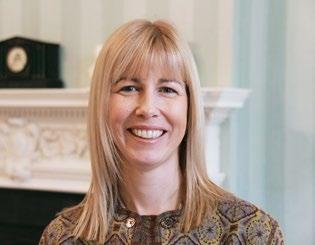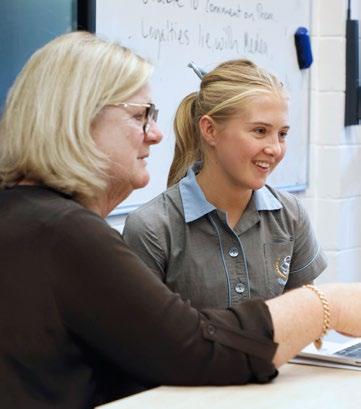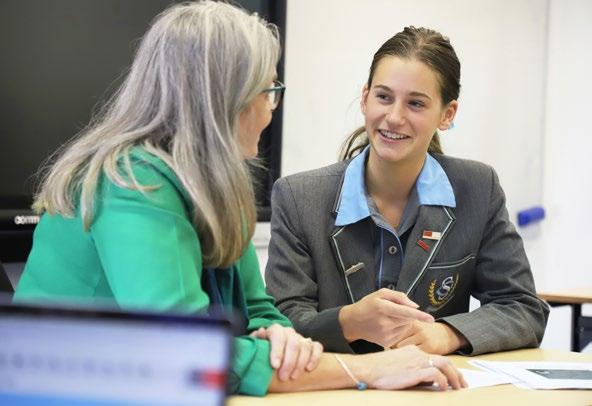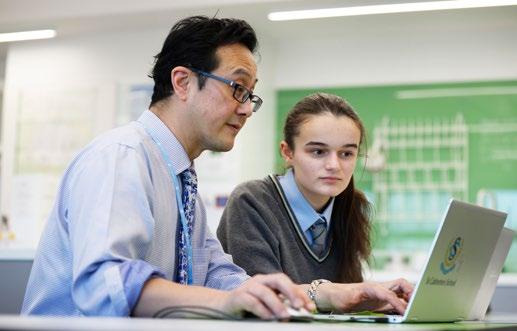
16 minute read
Our Leadership

The nurturing and supportive environment of St Catherine’s School through its academic program, student wellbeing and co-curricular opportunities underpin a commitment to support its girls navigate the highs and lows of the teenage journey.
Today’s generation of girls face a contradiction of opportunities mirrored with challenges. The ordinary pressures of growing up are now cluttered with distractions of technology and competitive landscapes. St Catherine’s close-knit community offers a shared journey between students, teachers and parents.
Through its age appropriate Wellbeing Programs, St Catherine’s supports our students to navigate the school years with an integrated approach to physical, emotional and social wellbeing. The building blocks start young and are grounded in the foundations of our values. Under the guidance of highly qualified staff, the programs are tailored for each year level and provide opportunities for students to build on their self-confidence, resilience and self-esteem.
We can learn a lot from nature and process of growth. The story of the bamboo tree is one of slow evolution, laying unseen foundations, growth and incredible strength. Once a bamboo seed is planted it appears to be inactive for years. Underground, it is building its foundation and building a network of strong roots. When it is time, this underground supports the plant above the ground.
St Catherine’s Wellbeing Program exposes students to a range of experiences and learning, supporting developmental skill building. These skills are essential in preparing our girls to embark on their journey and to face life’s challenges beyond the school gate with confidence and a strong base, which is not shaken in the face of adversity.
From the Principal

Our Teaching for Thinking Agenda, was launched based on the premise that students will have the opportunity to develop a stronger capacity in critical, creative and analytical thinking.
Yet, notwithstanding the most unprecedented and demanding challenges of recent times, our vision developed at the beginning of 2020 continues. We surge ahead in planning for a rapidly changing educational landscape, as we prepare our students with the confidence and capability to embrace the unknown ahead.
At the heart of our inclusive and connected School community is the holistic nurturing of young women – intellectually, emotionally and spiritually. It is this richness of relationships that has been developed over many years that stands tall through turbulent times, and it is this unwavering sense of community spirit that has re-emerged during this current global pandemic. I reminded the Senior School girls of St Catherine’s history during World War II, when students and staff were relocated to the country town of Warburton. With the Defence Force acquiring the residence of Sherren House, and without the technology enjoyed in 2020, it was
STRENGTH IN THE FACE OF ADVERSITY

The St Catherine’s School year commenced with conversations focused on developing the new School Strategic Plan with excitement around the opportunity to plan for the changing educational landscape for our students.
unquestionably a challenging school year. These testing times defined these courageous women, and imbued a spirit at St Catherine’s that continues today.
This year, I have witnessed the incredible commitment and strength of the School community. Despite the global upheaval, the St Catherine’s community has demonstrated a genuine sense of care, generosity and spirit apparent to all that are connected to the School.
Our students have shown resilience and determination in the face of disruption to learning. Despite social distance from their friends and teachers, they have approached their Learn@Home programs with eagerness and curiosity, supported and encouraged by family teachers. The St Catherine’s teaching staff in the space of a few, short weeks have experienced years of professional learning and personal development. Their commitment and genuine concern for student learning and wellbeing has been profound and remarkable. When presented with no other alternative, they prepared teaching programs with dedication and readiness, as they equipped themselves for teaching in a different format. This transition to online learning was made easier by the enormous work undertaken by our teaching staff and ICT teams who envisioned this need well before many other schools. Our readiness with technology and the collaboration of colleagues, has facilitated positive outcomes that were beneficial for student learning, offering as minimal disruption as possible.
Comments from students have been favourable and encouraging, and I give heart-warm thanks to parents who have taken the time to email me with their generous comments. I enjoyed reading these emails and forwarding their appreciation to our dedicated staff. I do, though remain mindful of the strain that this has caused many people amid a time of confusion.
Yet, it is through this commitment and spirit that has seen the St Catherine’s community come together to the beat of a new rhythm and will see our community adapt and thrive in these uncertain times. The St Catherine’s community is diverse and strong, and the expertise of the wider community has also been evident across a range of financial, medical, legal, education, and economic sectors. Their guidance, strength in diversity and critical thinking will ensure the School navigates with wise consideration through this challenging period.
At the end of March, with the closure of our School Campus and transition to our Learn@ Home Program, I reflected on the sadness of not seeing our girls within the School grounds. During these unique and extraordinary times, I share those reflections again:
“In Term 4 of every year, I reflect on the joy of celebrating with the Year 12 graduating class on their last day of School as they undertake a rite of passage walking through the wrought iron gates of Heyington Place for their final time as schoolgirls. Together, teachers and younger students line the driveway, forming a guard of honour to cheer on the girls. It is a colourful dash for the girls with laughter, singing and smiles. And so it was, today, with much sadness that I glanced down the driveway, barely able to look at our beautiful gates, standing strong but closed. I reassure myself and others around me that this will pass, and the gates will re-open, the roses will bloom and we will laugh together with our extraordinary Year 12 girls, the Class of 2020, as they too will make their colourful dash in Term 4 through the Heyington Gates.”
NURTURING THE LEARNER

St Catherine’s School staff pride themselves on knowing our girls and knowing them well. We recognise that an essential component of supporting students is a holistic approach to Academic Care; nurturing the learner in their academic and personal journey. In recognition of this integral connection between the cognitive and social emotional development of each student, the Pastoral Program in the Senior School includes a weekly Academic Advisory session with the House Tutors. In addition to the Wellbeing sessions, the Level or House Assemblies, and the Academic Advisory sessions, these all offer students academic ‘checkins’ to discuss strategies for meeting challenges and attaining their goals.
Initial sessions have included activities, readings and videos to support students with a better understanding of the learning process, the neuroplasticity of the brain, the importance of a growth mindset and
how to adopt efficient problem solving and study strategies, specifically to ‘set themselves up’ for a productive year. Students will continue to utilise their ePortfolio to set goals, track their learning progress, reflect on feedback and take part in readings and discussions.
In the Years 10 to 12 Academic Advisory sessions, these conversations will also be supported by data provided by the Dean of Academics, Ms Kirsten Wiley, who monitors individual student data as they progress through the upper year levels in the Senior School. House Tutors are already commenting on the value of this dedicated time to get to know the girls personally and as learners.
As part of our journey mapping of each student’s progress through the school, the Academic Advisory sessions focus on achieving the broader goal of guiding the students to become resilient and courageous learners, to achieve ‘academic buoyancy’ as it is often

dubbed. Australian psychologists Andrew Martin and Herbert Marsh proposed that building students’ academic buoyancy is one way to promote long-term resilience. Martin defines academic buoyancy as the ability of students to rebound from daily setbacks that are a normal part of schooling, such as a poor grade on a test, negative feedback from a teacher or being cut from a sports team. He demonstrates the key link between academic ‘skill’ and the ‘will’ to succeed, noting the interrelationship between personal and social wellbeing and academic progress.
The Academic Advisory sessions aim to assist the girls to see learning as a progressive and challenging journey, where set-backs, mistakes and failures will occur as part of that process, with each one building stronger cognitive pathways and greater personal resilience.
CRITICAL INQUIRY, INTELLIGENT LEARNING

At St Catherine’s, every teacher’s primary focus is to deliver the best education for the girls they teach every day. Despite our very high standards of practice, there is a strong belief that we can improve.
Of particular interest, and a growing concern amongst teachers, is that students are too often focused on learning facts to obtain grades. A more sophisticated approach to their learning is required.
The School has commenced a collaborative relationship with the University of Queensland and Peter Ellerton who is a lecturer in critical thinking and the founding director of the University of Queensland Critical Thinking Project. Peter argues that: “Schools need to better prepare young people for an increasingly complex world. Of paramount importance is the ability to think critically and work with others to approach complex problems in novel ways. These are becoming ever more important for all young people to acquire in order to thrive in a world increasingly globalised and augmented by technology. There are, therefore, more frequent calls for students to have stronger capacities in critical and analytical thinking so that they might identify biases in news, data and in their own interpretations, develop deeper understanding of complex ideas and empathy for different perspectives.” This project aims to improve teacher capacity to teach for thinking, not just for learning. At the heart of the project we are evolving the best ways to develop student understanding by focussing on their thinking. Teachers are concerned about the passivity students can demonstrate in the face of intellectual challenge.
Peter Ellerton has developed a pedagogical schema which is focussed on the content knowledge of intellectual inquiry. Three imperatives or principles of action are to:
1
2
Shift the focus from knowledge to inquiry; Think and plan in the language of student cognition; and
3
Work collaboratively when thinking can be shared.
The schema outlines a relationship between cognitive skills, intellectual values and intellectual dispositions, which will be the focus of our teaching and learning across the school. Teachers will develop their skills and knowledge in ensuring all classes emphasise three critical aspects of intellectual inquiry.
COGNITIVE SKILLS such as Evaluating, Analysing, Interpreting, Synthesising and Problem-solving. VALUES (provide feedback on the acquisition of the cognitive skills) such as Clarity, Precision, Accuracy, Coherence and Tolerance of ambiguity.
DISPOSITIONS (habits that come from mastery of the values) such as Independence, Persistence, Resilience, Integrity, Curiosity, Empathy and Global responsiveness.
We aim to grow our learning culture at St Catherine’s so that teachers and students have common language, common understanding and common approaches to high quality intellectual endeavour.
John Dewey the prominent educational reformer in the first half of the twentieth century, whose ideas have been influential in education and social reform commented that “Thinking is the method of intelligent learning”. Our goal is to make sure intelligent learning is in every classroom, every day.
Mr Robert Marshall Deputy Principal – Teaching and Learning

Meet Our School Captains
SENIOR SCHOOL CAPTAINS ALEXANDRA SHERGOLD & SOPHIE BOYCE JUNIOR SCHOOL CAPTAINS ELODIE SCOTT-ELLIOT & GISELLE UPTON
Senior School Captains
WHAT DO YOU HOPE TO ACCOMPLISH IN YOUR ROLE AS SCHOOL CAPTAIN THIS YEAR?
Alexandra: I want to build on the harmony and strength of community that St Catherine’s has become so familiar with over the years; to make all the girls feel as if they are an important part of St Catherine’s community, because they are.
Sophie: Like every good leader, I hope I have the ability to influence girls in achieving their best but also leave a legacy at St Catherine’s. I want to focus on leading from within rather than the front meaning I want to build valuable relationships with girls.
ONE WORD THAT BEST DESCRIBES WHAT KIND OF SCHOOL CAPTAIN YOU WOULD LIKE TO BE?
Alexandra: Real. In the interview panel in assembly last year, this was both the first word that came to mind when asked this question, and the word I used. I still stand by that. I want to lead by being no one else but me, to reach out to the girls in an authentic way and to show them that by being themselves is more than enough.
WHAT IS THE MOST ENJOYABLE ELEMENT OF BEING PART OF ST CATHERINE’S SCHOOL?
Alexandra: At St Catherine’s, there are always moments that ignite that sense of belonging that the School community never lets slip away. All the enjoyable elements of being a part of this School lead back to such strength of community. Countless times spent with both my year level and others have constituted an unbreakable bond that we will share forever.
Sophie: The ability to get involved in as many co-curricular activities as you wish. I love being able to meet different girls playing sports through Girls Sports Victoria, participating in the plays, involving myself in music and dominating in debating.
HOW DID YOU BECOME INTERESTED IN A STUDENT LEADERSHIP ROLE?
Alexandra: Putting myself up for School Co-Captain was a direct result of how much I admired the ones preceding me; the result of the unfathomable (at least, for me) thought that I could inspire other girls just as they had inspired me. I love to reach out and connect with people, and I have always wanted to have an impact on the School in some form or another.
Sophie: I have always found myself in a leadership role throughout my life. When I was appointed Junior School Captain I began to realise my potential and how my desire to create valuable relationships with everyone translates into my leadership perfectly.
WHAT IS ONE QUALITY A GOOD LEADER NEEDS TO HAVE?
Alexandra: Empathy.
Sophie: A good leader must be able to delegate. This is an everyday task that is valuable especially in Year 12 to maintain a healthy balance.
HOW WOULD YOU LIKE TO BE REMEMBERED AS A STUDENT LEADER OF ST CATHERINE’S?
Alexandra: I want to be remembered as the kind one, the one who harmonised the School just that little bit more. I don’t necessarily feel the need to leave a big legacy, just a unique one.
Sophie: I wish to be remembered as someone who was always up for a chat, whether it is in the library about school work or around the fountain about weekend activities. I want to be able to use my role to create those friendships and be approachable.
WHAT IS ONE THING YOU WOULD LIKE TO TAKE WITH YOU FROM THE EXPERIENCE OF BEING SCHOOL CAPTAIN?
Alexandra: An understanding of how to be a good leader, and a better version of myself.
Sophie: Hopefully I will be able to take the ability to influence others with me into future life and jobs. School Co-Captain allows Alex and I the opportunity to leave a positive impact on girls which I know we both are so excited to do.

Junior School Captains
HOW DID YOU FEEL WHEN YOU FOUND OUT THAT YOU HAD BEEN ELECTED TO THE ROLE OF JUNIOR SCHOOL CO-CAPTAIN?
Elodie: I was overjoyed; at first, I thought it was a dream.
Giselle: I was over the moon excited! My sister Charlotte Upton had been one and I really wanted to be a School Captain like her! I was thrilled to find out I was a School Captain.
WHAT ARE YOU LOOKING FORWARD TO THE MOST ABOUT BEING JUNIOR SCHOOL CO-CAPTAIN?
Elodie: I am looking forward to speaking at assembly each week.
Giselle: I am most excited to work with Ms McArdle and learn new things from her.
WHY WAS IT IMPORTANT TO YOU TO BE JUNIOR SCHOOL CO-CAPTAIN?
Elodie: It was important because it was my first big leadership role.
Giselle: I wanted to prove to myself that I can do something major. I wanted to prove that just because you have had surgeries, time off school for a while, being unique doesn’t mean that I can’t follow what I want to do.
WHAT DOES THE ROLE OF JUNIOR SCHOOL CO-CAPTAIN INVOLVE?
Elodie: The role of Junior School CoCaptain involves running the assembly and representing the school at special events.
Giselle: It involves a lot of thinking, learning, listening, trust, responsibility and many more things.
WHAT WOULD YOU LIKE TO ACHIEVE IN YOUR ROLE AS JUNIOR SCHOOL CAPTAIN?
Elodie: I would like to support students being more confident when speaking to a large crowd of people as I think it is important for students to be confident.
Giselle: To be the best School Captain I can. I want to achieve that because it proves to myself that I can do it.
HOW WOULD YOU LIKE YOUR EXPERIENCE OF BEING JUNIOR SCHOOL CO-CAPTAIN TO BE?
Elodie: I would like it to be challenging, everyone loves a challenge, right?
Giselle: I would love everyone to respect other people, be kind 24-7, and know how to treat people the way they want to be treated and just a really nice place to be.
WHAT DO YOU ENJOY THE MOST ABOUT ST CATHERINE’S SCHOOL?
Elodie: I enjoy the hands on learning at St Catherine’s.
SENIOR SCHOOL YEAR 12 CAPTAINS
School Co-Captains Sophie Boyce Alexandra Shergold Student Executive Sophie Boyce Claire Hayne Isabella McDonald Chloe Rodgers Alexandra Shergold Serena Sitch Art & Design Isobel Simon Lara Natrass Boarding Elena Tan Zoe Meggitt Community Service Ella Carton Penelope Drummond Cultural Diversity Kaiyue Ren Debating & Public Speaking Isobel Tanner Drama Serena Sitch Duke of Edinburgh Margaret Handolias Music Choral Indiana Wilde Music Instrumental Julia Thompson Spirit & Wellbeing Tess Hogan Sport Thalia Barbayannis Harriet Fortey House Beaulieu Blair Charlotte Murdoch Emma Robertson House Davis Isabella McDonald Romy Cantwell House Holmes Kilbride Millie Fraser-Smith Charlotte Gough House Langley Templeton Sophie Hogan Annabel Whiter Jorgenson Orchestra Sophie Hogan Concert Band Lucy Croft Athletics Isabella McDonald Cross Country Charlotte Gough Rowing Harriet Fortey Romy Cantwell Snowsports Charlotte Murdoch Swimming Romy Walker
BARBRECK LEADERSHIP POSITIONS
School Captains Giselle Upton Elodie Scott-Elliott Music Captains Isabelle Cao Minnie Chen House Langley-Templeton Isabelle Peter Mia Upton House Davis May Sutton Amity Morris House Holmes-Kilbride Emma Peele Lexie Hill House Beaulieu Blair Lulu Kyriakou Diya Asthana Library Captains Alice Sutton Ava Ward Academic Reporters May Aiello Mila Heng Arts Reporters Chloe Thomas Ava Murray Environment Reporters Scarlett Evans Harper Roberts Sport Reporters Kristin Dodd Lily Van der Venne









